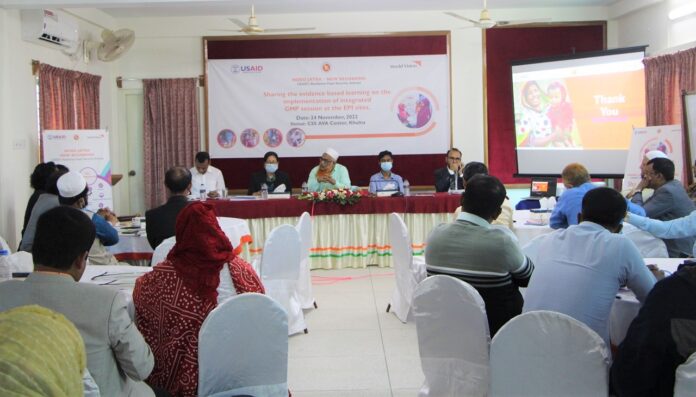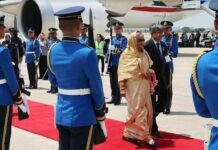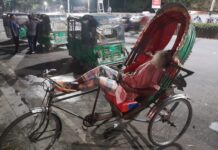USAID’s Nobo Jatra Project keeps footstep in Khulna & Satkhira
Khulna, Thursday, 24 November 2022:
Khulna Division’s Director-Health Dr. Monjur Murshid on Thursday said the government health officials must be regular at office to provide better service to the community people.
“Unless we change our mentality, attend office regularly, and work accordingly, there will be no use of appointing extra workforce in health sector. The existing health staff must be punctual. Wherever we are appointed, we should play our role accordingly,” he said.
He made these remarks while presiding over an event titled “Sharing the evidence based learning from an assessment on the implementation of integrated GMP session at the EPI sites” organized by USAID’s Nobo Jatra Project (NJP) ‘new beginning’ at CSS AVA Center in Khulna.
The 7-year-long NJP was implemented in 40 unions under 4 Sub-districts in Khulna and Satkhira districts by World Vision (WV) Bangladesh in close partnership with the Ministry of Disaster Management and Relief (MoDMR), Winrock International and World Food Programme.
Dr. Md. Mofizul Islam Bulbul, Line Director (Acting), Institute of Public Health & Nutrition (IPHN)/ National Nutrition Services (NNS); Dr. Geeta Rani Devi, PM-CM, CBHC, Dhaka; and Dr. B. M. Riazul Islam, Deputy Chief (Medical), MIS-DGHS, Dhaka were present as special guests at the event.
The event was also attended by Dr. Suzat Ahmed, Civil Surgeon, Khulna, senior level health officials of Khulna division. Mr Ashis Kumar Halder, Senior Operations Manager, NJP, was present at the event.
Dr. Mushtaque Ahmed, Senior Technical Advisor, Nobo Jatra Project, WVB, shared NJP experiences and learning from the implementation of integrated GMP session at the EPI sites.
Mehzabin Rupa, Manager, Knowledge Management, Communications and Advocacy, shared a study findings on the implementation of integrated GMP sessions by the MHVs at the EPI sites. Feroz Ahmed, MCHN Advisor, NJP conducted and open discussion and question-answer session after the sharing of research findings.
Dr. Geeta Rani Devi, PM-CM, CBHC, Dhaka, thanked NJP of World Vision Bangladesh for MoU to work in community clinics in Bangladesh and said “Community Clinic is very effective for serving people on the ground. 14,154 CC are there in Bangladesh.”
Attending the event as special guest, Dr. B. M. Riazul Islam, Deputy Chief (Medical), MIS-DGHS, Dhaka, said “Multipurpose Health Volunteers were assigned to search lost patients and bring them to community clinic by motivation. However, data and information from four upazilas cannot be included in the national database unless it is started nationally.”
Aiming to improve gender equitable food security, nutrition and resilience of vulnerable communities, NJP reached 859,704 people with multi-sectoral interventions in Water Sanitation and Hygiene, Maternal Child Health and Nutrition, gender, agriculture and alternative livelihoods, disaster risk reduction and good governance and social accountability.
Nobo Jatra has developed partnership with Community Based Health Care (CBHC), the Government unit responsible for community clinics, to roll out the MHV pilot across project working areas. The MHVs are paid, performance-based positions by Government on a per-service-basis as provided in their Terms of Reference (ToR). With NJP’s facilitation, GoB deployed 905 Multi-Purpose Health Volunteers who have been conducting GMP at EPI sites since 2020.
Altogether 25,813 pregnant and lactating women in the project area received over BDT 725 million for 15 months (BDT 2,200 per month) which was a huge support to health and nutrition in community level.
The NJP has supported 65,739 children under 2 years of age, trained more than 7,000 government health staff and conducted massive awareness event on health and nutrition to mothers, husbands, mother in laws and community people resulting significant rise of exclusive breastfeeding, Ante and Post Natal Care for pregnant and lactating mothers.
































